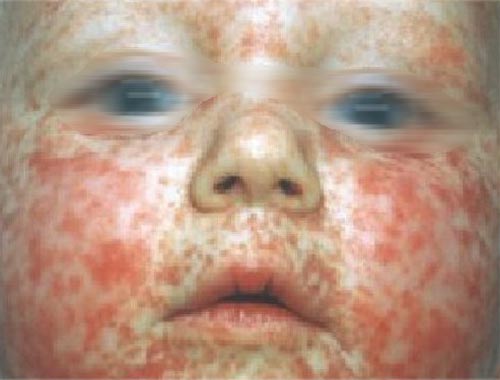Measles (Rubeola)

Published: 18 Jun 2025
ICD9: 055.9 ICD10: B05.9 ICD11: 1F03
Measles (also known as Rubeola) is a highly contagious viral infection that is serious for small children but is easily preventable by a vaccine.
Here's a breakdown of key aspects:
![]() Cause: Caused by the measles virus.
Cause: Caused by the measles virus.
![]() Transmission: Spreads through the air by respiratory droplets produced when an infected person coughs or sneezes. The virus can live in the air or on surfaces for up to two hours after an infected person has left the room. It's incredibly contagious - up to 90% of unvaccinated people exposed to the virus will get it.
Transmission: Spreads through the air by respiratory droplets produced when an infected person coughs or sneezes. The virus can live in the air or on surfaces for up to two hours after an infected person has left the room. It's incredibly contagious - up to 90% of unvaccinated people exposed to the virus will get it.
![]() Symptoms:
Symptoms:![]()

![]() Initial Symptoms (10-14 days after exposure): Typically start with a mild to moderate fever, persistent cough, runny nose (coryza), inflamed eyes (conjunctivitis), and sore throat.
Initial Symptoms (10-14 days after exposure): Typically start with a mild to moderate fever, persistent cough, runny nose (coryza), inflamed eyes (conjunctivitis), and sore throat.![]()

![]() Koplik's Spots: Small white spots with bluish-white centers on a red background that appear inside the mouth, usually on the inner lining of the cheeks (buccal mucosa). These are a tell-tale sign of measles and appear 2-3 days after the initial symptoms.
Koplik's Spots: Small white spots with bluish-white centers on a red background that appear inside the mouth, usually on the inner lining of the cheeks (buccal mucosa). These are a tell-tale sign of measles and appear 2-3 days after the initial symptoms.![]()

![]() Rash: A characteristic red, blotchy skin rash appears 3-5 days after the initial symptoms. It typically starts on the face at the hairline and spreads down the body. The fever may spike with the appearance of the rash.
Rash: A characteristic red, blotchy skin rash appears 3-5 days after the initial symptoms. It typically starts on the face at the hairline and spreads down the body. The fever may spike with the appearance of the rash.
![]() Complications: Measles can lead to serious complications, especially in young children and adults. These can include:
Complications: Measles can lead to serious complications, especially in young children and adults. These can include:![]()

![]() Ear infections (otitis media)
Ear infections (otitis media)![]()

![]() Pneumonia
Pneumonia![]()

![]() Encephalitis (brain inflammation) which can cause permanent brain damage
Encephalitis (brain inflammation) which can cause permanent brain damage![]()

![]() Diarrhea
Diarrhea![]()

![]() Blindness
Blindness![]()

![]() Death (Measles is a leading cause of death among young children globally, even though a safe and cost-effective vaccine is available.)
Death (Measles is a leading cause of death among young children globally, even though a safe and cost-effective vaccine is available.)
![]() Prevention: The measles, mumps, and rubella (MMR) vaccine is highly effective in preventing measles. Two doses of the MMR vaccine are recommended. Vaccination provides long-lasting immunity.
Prevention: The measles, mumps, and rubella (MMR) vaccine is highly effective in preventing measles. Two doses of the MMR vaccine are recommended. Vaccination provides long-lasting immunity.
![]() Treatment: There is no specific antiviral treatment for measles. Treatment focuses on relieving symptoms and preventing complications. This includes:
Treatment: There is no specific antiviral treatment for measles. Treatment focuses on relieving symptoms and preventing complications. This includes:![]()

![]() Rest
Rest![]()

![]() Fluids
Fluids![]()

![]() Fever-reducing medication
Fever-reducing medication![]()

![]() Vitamin A supplementation (in some cases, especially in developing countries)
Vitamin A supplementation (in some cases, especially in developing countries)![]()

![]() Treatment of complications like pneumonia or ear infections.
Treatment of complications like pneumonia or ear infections.
![]() Importance of Vaccination: Measles vaccination is crucial for protecting individuals and preventing outbreaks. High vaccination rates in a community provide herd immunity, which protects those who cannot be vaccinated (e.g., infants too young to be vaccinated, people with certain medical conditions). Declining vaccination rates have led to resurgences of measles in some areas.
Importance of Vaccination: Measles vaccination is crucial for protecting individuals and preventing outbreaks. High vaccination rates in a community provide herd immunity, which protects those who cannot be vaccinated (e.g., infants too young to be vaccinated, people with certain medical conditions). Declining vaccination rates have led to resurgences of measles in some areas.
![]() Public Health Significance: Measles is a reportable disease. Public health agencies track cases to identify outbreaks and implement control measures, such as vaccination campaigns.
Public Health Significance: Measles is a reportable disease. Public health agencies track cases to identify outbreaks and implement control measures, such as vaccination campaigns.
![]() Diagnosis: Measles is usually diagnosed based on the characteristic rash and other symptoms. Laboratory tests (blood tests or nasal swabs) can confirm the diagnosis.
Diagnosis: Measles is usually diagnosed based on the characteristic rash and other symptoms. Laboratory tests (blood tests or nasal swabs) can confirm the diagnosis.
In summary, measles is a dangerous but preventable disease. Vaccination is the best way to protect yourself and your community from this highly contagious virus. If you suspect you or someone you know has measles, contact a healthcare professional immediately.